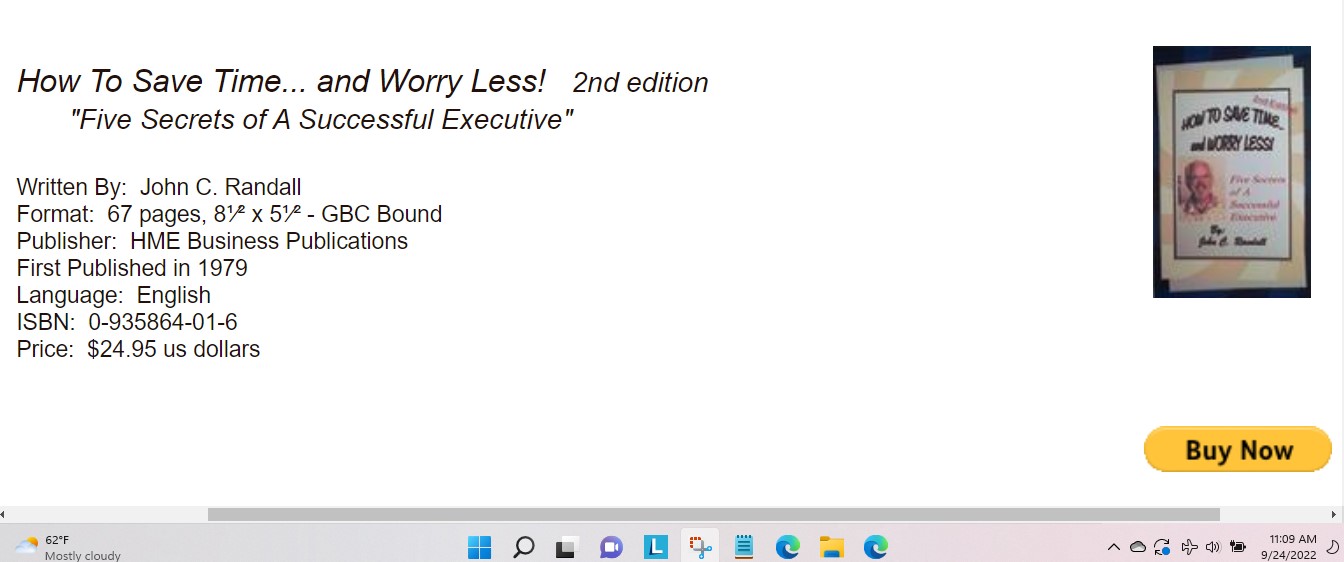1
WHICH REALLY IS YOU: CAPTIVE OR FREE?
by John C. Randall, Timeless Truth Article #rK24
The difference between an entrepreneur and an intrapreneur is that one takes most all the risk in an effort to build personal equity, while the other takes the initiative and applies it within an existing organization, uses its resources, and seeks advancement, i.e. promotion and raises. Both are the movers and shakers, the ones who rock the boat, and when they plan carefully before they act, they just might get results. They know the real difference between activity (busy work expanded to fill the available time) and accomplishments (value added use of their time and talents)!
The intrapreneur, if frustrated within an organization, will very likely lay the groundwork to be an entrepreneur. But only about one out of four is satisfied in their job; the rest are looking at the grass on the other side of the fence, and thinking that it is greener (although that frequently is not the case - it also needs water!).
A bit of introspection: “What are your motives to transition from a payroll job to being a business owner, entrepreneur, or corporate intrapreneur?” If you are clear in your response, it will help you as you focus your plans so that they more closely match your passion, vision, and mission during your own personal cycle of life.
Here are some basic questions to consider:
1. No matter your current age, are you attracted to the idea of creating enterprises? You are an Aspiring Entrepreneur.
2. Do you feel like you must resort to enterprise creation to supplement your income? This would make you a Survival Entrepreneur.
3. Are you driven to create enterprise(s) in order to pursue a certain lifestyle or live in a particular type of community? You are a Lifestyle Entrepreneur.
4. Do you feel strongly motivated to develop and expand businesses to create jobs and wealth? You would be considered a Growth Entrepreneur.
5. Already created a business or two, and want to go on to create several more growth businesses? This would lead to your being called a Serial Entrepreneur.
6. Are you inspired to create and grow enterprises that are primarily for public and community purposes? You probably are a Social Entrepreneur.
7. Is your reality that most employers cannot -- or will not -- hire you? They have many reasons - you know their excuses if this is you. You have to create your own income opportunities. There could be a lot of unspoken issues may be forces that act on your choices. You could be considered to be an Outcast Entrepreneur.
Are you potentially an Outcast Entrepreneur? Let me challenge you to make a list of the excuses that could be used by others not to hire you or to do business with you. To get you started, here are just a few:
>> You are overqualified, or not qualified (formal and informal education level).
>> You have too little, or too much experience (translation, too young or too old).
>> You are too different, or not unique (see list of Federal laws about discrimination).
>> You are too extroverted, or too introverted (language and communication skills).
>> You just do not look the part (preconceived notions in mind of interviewer).
>> You ........
What did you add to this list? Did you consider all the unspoken ones that are nevertheless apparently present in the minds of others? But, are they really present in their minds, or just your mind?
As you reflect on these categories, the challenge is for you to honestly seek the best answer that applies to you: What is your primary category? Others might have a suggested answer, but the point here is to seek the real answer that is the you in your own mind.
Why is this important? It will help you understand the driving forces and motives that currently exist in your mind. You might want to use that understanding to bring clarity to your purpose in this life - and to help you focus on you own vision of your own success - and perhaps to start to take some first steps and make some changes.
WARNING: If most of your work life has been with large corporations, the government or other large organizations, a carefully planned and timed transition is essential, otherwise the odds are really stacked against your success. Take a long moment and think about what you really want, then why, when, where and how will you to do it. Look again at your job -- it might not be so bad after all. Do you still want to scratch your itch for career independence? Save time and stress, just view the FREE Case Study on this web site, take notes, and take the next steps right now.
ABOUT JOHN C. RANDALL
John Randall is a chemical engineer who jumped off the traditional corporate career track when he was 43 and since then he has focused on helping others to achieve a higher level of success. John is a trusted confidential advisor who helps individuals to grab control of their own career, income and time by using his expertise in self-leadership, self-marketing and self-control, based on genuine values and integrity. He has earned the moniker, "The Consultant's Consultant." John's clients are from a wide cross-section of ambitious individuals from throughout the United States of America. His proprietary insights has helped them save time and worry less as they gain their career track independence while also persevering in the spirit of agape love, joy, peace, patience, kindness, goodness, faithfulness, gentleness and most importantly, self-control as they focus on their self-leadership skills while minding the Master (cf. the Gal @ 5:22-23). If you enjoyed this article, don't forget to view the FREE Case Study and reach out for a free strategy session today.
© John C. Randall, 2018. www.MasterMinder.com All rights in all media world-wide reserved.





